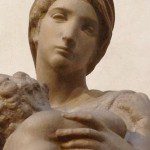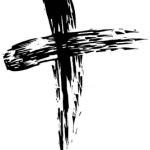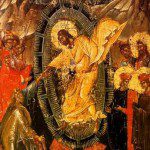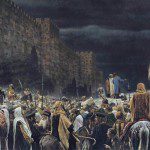This piece is the first of what I hope will be daily reflections for the season of Lent. The practice of lectio divina teaches us to listen as we read for the voice of the Spirit saying “Here:” Here is where you will find a gift, an open door, an insight, the direction or consolation you need. Sometimes the eye alights on a mere preposition or an inconspicuous modifier, sometimes on an image or a startling verb–and a little shock of recognition or flicker of curiosity incites you to “come and see.” May this Lenten season be one of showings and seeings, and of grace given and received every day.
* * *
Then Jesus was led up by the Spirit into the wilderness. Matt. 4:1, ESV
The Spirit immediately drove him out into the wilderness. Mark 1:12
Jesus, full of the Holy Spirit, returned from the Jordan and was led by the Spirit in the wilderness. Luke 4:1
Many of us who observe Lent as a time of reflection, spiritual renewal, fasting, and prayer enter it with hope and, perhaps, also with at least a few pangs of dread. Repentance and relinquishment are hard. Going into the “wilderness” is hard; those who enjoy treks and desert winds that howl under the tent flaps know this better than the rest of us. Those who really fast—monks and nuns in monasteries, inconspicuous people who come to work with unaccustomed hunger pangs—know it, too.
Lenten practices vary widely. Some young people I know take on an “electronic fast,” forfeiting screen time in favor of reading or solitary walks or simply the quiet that is often hard to come by. Some who suffer from clutter, undertake a “40 bags in 40 days” challenge, giving away one bag of stuff each day of Lent. Some give up alcohol or sugar or shopping.
None of these practices produces magical results. Jesus is pretty clear on this subject: when he urges the disciples toward fasting and prayer he warns them about doing these pious practices for the wrong reasons—to be seen, to feel good about their own righteousness, or out of legalism that always diverges from the way of love. When we do them rightly it is to invite the Spirit to lead us in those “paths of righteousness” the Psalmist speaks about toward the still waters and green pastures we long for.
How the Spirit leads us is an interesting matter. The Gospel writers give three curiously variant accounts of how Jesus, after his baptism was “led” by the Spirit into the wilderness. Matthew says he was “led up by the Spirit into the wilderness,” suggesting a guide who showed him the way to an appointed place of solitude and encounter with God. Mark, ever the more dramatic, writes that “the Spirit immediately drove him out into the wilderness”—a disturbing, even shocking verb that bespeaks urgency and, possibly, a certain resistance to leaving the glorious public moment of blessing at the riverside. Luke tells us that “Jesus, full of the Holy Spirit, returned from the Jordan and was led by the Spirit in the wilderness.” By this account we are led to assume that Jesus, already at one with the Spirit, knew where to go and went willingly, and, once there, was shown what to do. While these variations might be partly attributable to translation, they are worth noticing. This is how the Spirit works—showing up in the guise of another creature—a dove, a child, a whale, a friend—and summoning, directing, nudging, driving, revealing, and, along the way, comforting and sustaining. Letting us, as one poet put it, “learn by going where we have to go.”












